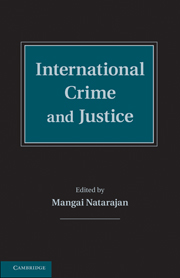Book contents
- Frontmatter
- Contents
- List of Figures
- List of Tables
- List of Contributors
- Foreword
- Preface
- Introduction
- Part I International Criminology
- Part II Law, Punishment, and Crime Control Philosophies of the World
- Part III Transnational Crime
- Part IV Organized Crime and Terrorism
- Part V International crime
- Part VI Delivering International Justice
- Part VII International Cooperation and Criminal Justice
- 54 World Policing Models
- 55 Crossborder Policing
- 56 Challenge and Transition
- 57 The European Union and Judicial Cooperation
- 58 The Longer Arm of the Law
- 59 International Cooperation to Combat Money Laundering
- Part VIII International Research and Crime Statistics
- Part IX International research resources
- World Map
- Index
- References
54 - World Policing Models
Published online by Cambridge University Press: 05 October 2014
- Frontmatter
- Contents
- List of Figures
- List of Tables
- List of Contributors
- Foreword
- Preface
- Introduction
- Part I International Criminology
- Part II Law, Punishment, and Crime Control Philosophies of the World
- Part III Transnational Crime
- Part IV Organized Crime and Terrorism
- Part V International crime
- Part VI Delivering International Justice
- Part VII International Cooperation and Criminal Justice
- 54 World Policing Models
- 55 Crossborder Policing
- 56 Challenge and Transition
- 57 The European Union and Judicial Cooperation
- 58 The Longer Arm of the Law
- 59 International Cooperation to Combat Money Laundering
- Part VIII International Research and Crime Statistics
- Part IX International research resources
- World Map
- Index
- References
Summary
OVERVIEW
When members of the public travel abroad and experience crime and the response of the police in these other countries, they take with them a common sense notion of what “the police” means. They will often draw distinctions between their own society and these “other” systems. Teasing out the similarities and the differences between police systems and their components in different societies, explaining the differences, drawing examples of good practice that might be introduced elsewhere, and learning from experiences of bad practices – these are the key features of comparative police studies. While the difficulties surrounding such endeavors may be considerable, the potential benefits make the challenge worthwhile.
The nature of “the police” varies markedly between countries and over time. For example, the public police model that emerged in the United Kingdom and United States in the nineteenth century differed from the centralized, autocratic arm of state authority that preceded it on continental European (Chapman, 1970), and while the crossnational interchange of ideas in recent years has resulted in police structures and methods from one country being imported to others, there are still stark contrasts. This chapter, therefore, begins by offering a definition of the police that incorporates variations, before moving on to consider alternative models and recent trends.
- Type
- Chapter
- Information
- International Crime and Justice , pp. 409 - 415Publisher: Cambridge University PressPrint publication year: 2010
References
- 1
- Cited by



